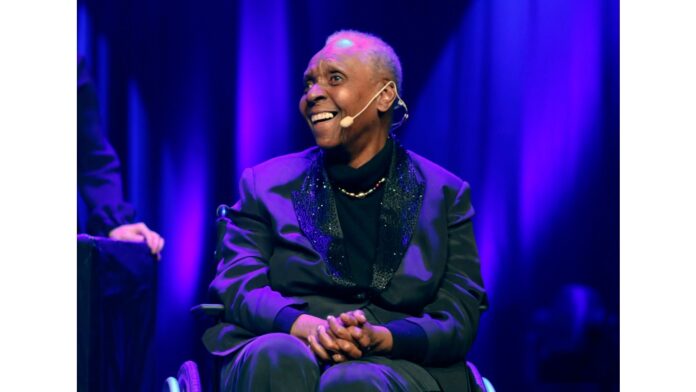
Maryse Condé, an acclaimed French-language novelist from Guadeloupe who in novels, stories, plays and memoirs imagined and redefined the personal and historical past from 17th century New England to contemporary Europe, has died at age 90.
Condé, winner in 2018 of an “alternate” Nobel Prize, died Monday night at a hospital in Apt, outside Marseille. Her longtime editor, Laurant Laffont, told The Associated Press that she had suffered from a neurological illness that impaired her vision to the point of having to dictate her final novel, “The Gospel According to the New World.” But she still enjoyed a 90th birthday celebration, in February, when she was joined by family and friends.
“She was smiling, she was joyous,” said Laffont, who otherwise remembered her as a woman of uncommon intensity and generosity. “It was a wonderful farewell, a truly great sendoff.”
Condé, who lived in Luberon, France in recent years, was often called the “grande dame” of Caribbean literature. Influenced by Frantz Fanon, Aimé Césaire and other critics of colonialism, she was a world traveller who probed the conflicts between and within Western culture, African culture and Caribbean culture, and the tensions between the desire for liberation and what the author would call “the trap of terrorism and simplistic radicalisation.”
With her husband, Richard Philcox, often serving as her English-language translator, Condé wrote dozens of books, ranging from historical explorations such as “Segu,” her best known novel, to the autobiographical stories in “Tales from the Heart” to fresh takes on Western literature. She reworked “Wuthering Heights” into “Windward Heights,” and paired a West Indian slave with Hester Prynne of “The Scarlet Letter” in “I, Tituba, Black Witch of Salem.”
“A historian is somebody who studies the facts, the historical facts — somebody who is tied to what actually happens,” she explained in an interview included in the back section of “I, Tituba,” published in 1992. “I am just a dreamer — my dreams rest upon a historical basis. Being a Black person, having a certain past, having a certain history behind me, I want to explore that realm and of course do it with imagination and my intuition. But I am not involved in any kind of scholarly research.”
oment,” she wrote in “Tales from the Heart,” published in 1998. “Reading Joseph Zobel, more than any theoretical discourse, opened my eyes. I understood that the milieu I belonged to had absolutely nothing to offer and I began to loathe it. I had become bleached and whitewashed, a poor imitation of the little French children I hung out with.”
Like many young idealists in the 1960s, she moved to Africa, spending much of the following decade in Ghana, Guinea and other newly independent countries. She would discover, like many of her contemporaries, that African leaders could be as oppressive as colonial leaders, experiences she drew upon for her debut novel, “Heremakhonon,” published in 1976.
“When I was in Guinea, there was a department store with that name (Heremakhonon),” Condé told Howard University professor Francoise Pfaff during an interview that appears in Pfaff’s “Conversations with Maryse Condé,” published in 1996. “In theory, this store offered everything people needed, but it had nothing except Chinese toys of poor quality. For me it was a symbol of independence.”
Whether in Guadeloupe, Paris, Africa or the US, she often felt apart from the general population; the author liked to say that she didn’t write in French or Creole, but in her own language, “Maryse Condé.” She drew as much from oral history as from written history, navigating between the lost and dying worlds that oral tradition represented and the new world of mass media and what she called the “totally modern lifestyle.”
In 2023, she published “The Gospel According to the New World,” which she needed to dictate to her husband because of her neurological disorder. The book was a contemporary parable about a dark-skinned child in Martinique with grey-green eyes who may or may not be the son of God. Condé included an author’s note in which she called the book a “brief testament” to the faith and inner strength need to “change the world, though we might never achieve it.”
“Loving others seems to me to be the way, perhaps the only one, to make an impact,” she wrote.













